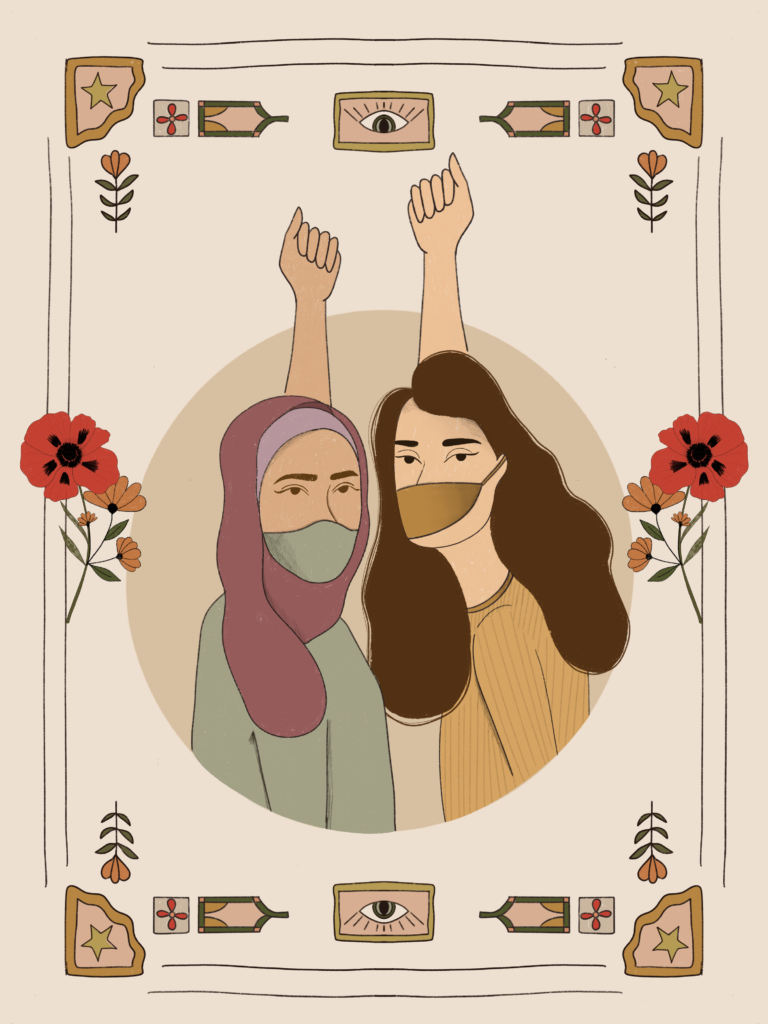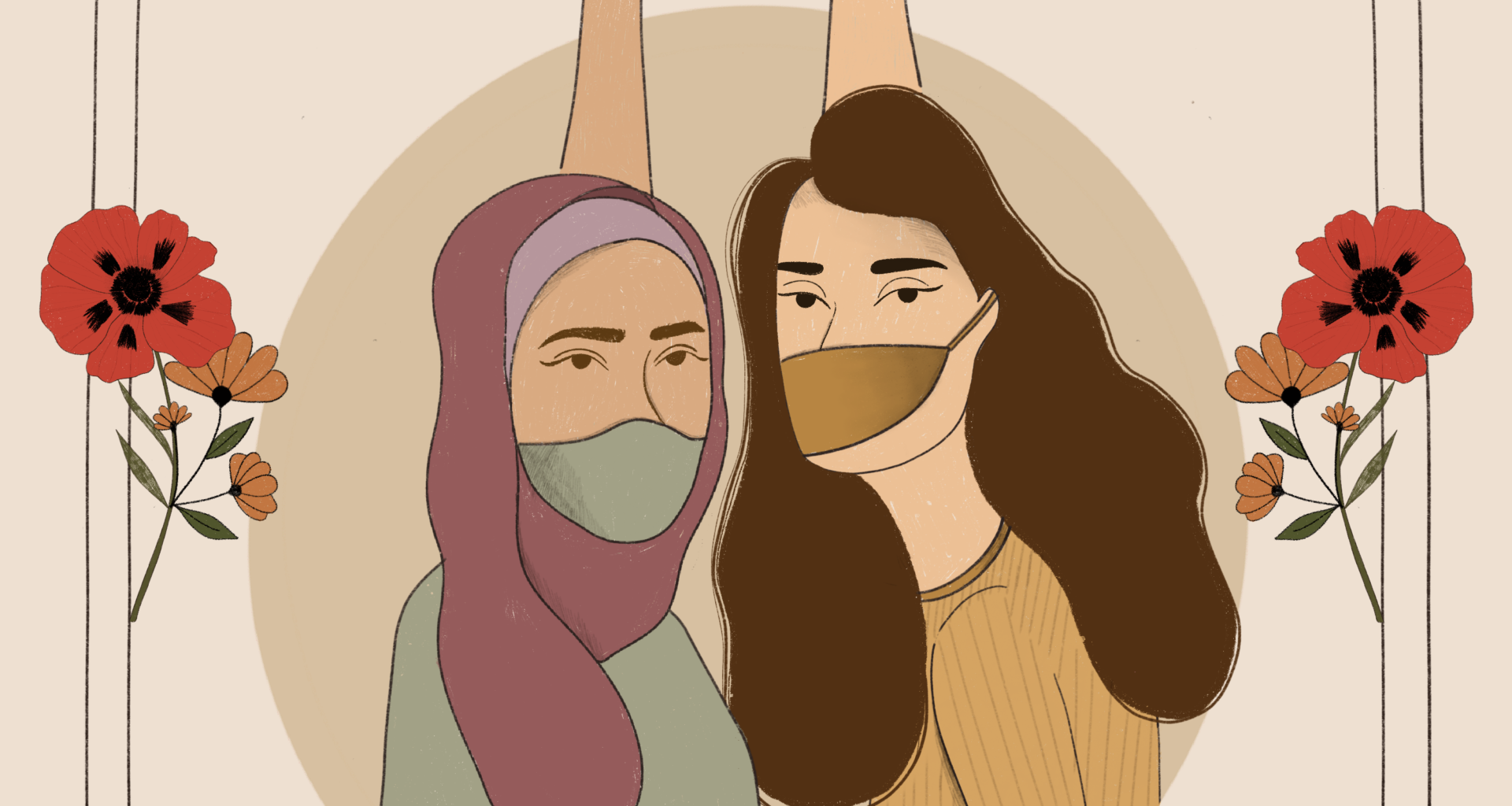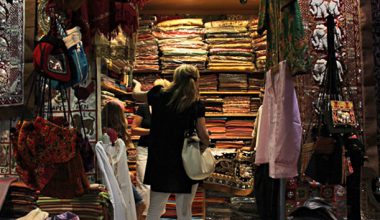Words: Dr. Melissa Langworthy
Illustrations: Fay Charafeddine
As restaurants reopen and rumors of airport openings abound, we in Kuwait are looking forward to a summer that promises to end eighteen months of COVID-19 – eighteen long months since the cancellation of the National Day festivities and last school days for our children. During this time, there have been various arrangements for quarantine, lockdowns, curfews, metered social outings, among the various other shifts that our lives have taken.
COVID-19 has clear, gendered impacts for women and girls across all spheres of life – from health, to the economy, to social policy and protection. While early clinical evidence shows men are more heavily affected by the health effects of the COVID-19 pandemic, the resulting economic crisis is disproportionately affecting women entrepreneurs.
Three elements have been found to trigger the gendered impacts of COVID on women entrepreneurs. First, the virus has triggered a shescession: globally, women’s industries are being harder hit. Some argue that the high proportion of women employed in the public sector, as well as the overrepresentation of migrant workers in many affected jobs, will lessen the impact on working women in the Gulf. However, neither of these circumstances will be protective for women entrepreneurs.

Early analysis showed that globally women-owned businesses were 5.9 percent more likely to close than male owned businesses. The factors given to explain this disparity focused on women’s overrepresentation in consumer-facing and service industries — including hotels, cafes and, education and child-care services as well as wellness, personal grooming, sports and fitness — which faced severe downturns and closures.
Second, women’s businesses are likely to be smaller, newer, and more vulnerable than men’s businesses. Survey research from Babson College (home of the Global Entrepreneurship Monitor) indicates that only around 40 percent of women entrepreneurs expect to resume normal operations within the year. While many of the women interviewed were showing a keen capacity to pivot their business models to adapt to COVID operational restrictions (such as by going online), adaptations to the economic and social support structures are necessary to support these moves in the long term.
Third, women entrepreneurs are juggling increasing burdens in unpaid care and domestic work as a result of school closures and eldercare demands. This “creates a perfect storm for women entrepreneurs” that is overlooked in the majority of business relief programs.
A full and gender responsive accounting of the multiple ways in which women entrepreneurs are interacting with and responding to the changing demands of COVID-19. To do so is to recognize that women business-owners face a heavy and growing care burden as childcare options and educational institutions remain restricted. Data from the Asia-Pacific region shows that men are also increasing their time spent on unpaid care and domestic work as a result of COVID, however the increase in time does not come close to meeting the demands women are facing. The lack of data on time use in the Gulf means that no specific data exists to track these changes in the region. Only two Gulf countries have data on unpaid care labor – Oman and Qatar – but this data shows that women spend 2.5 times more time than men in unpaid care and domestic work than men in Oman and nearly 4 times more time than men in Qatar.1
In this publication, and elsewhere, I have analyzed the economic and social issues impacting women entrepreneurs in the Gulf region. While it is true that, on average, women and men entrepreneurs congregate in different sectors, issues such as unpaid care and domestic work have uneven impacts on enterprise operations and contribute to the need for gender responsive policy response and support. Unfortunately, discussion of the intersection of economic and gendered impacts of COVID are rare: you can discuss gender or economy, but rarely are the realities of where these subjects intersect considered. However, it is in this intersection that women entrepreneurs live.
In this article, I ask what impact COVID-19 has had or is likely to have on women entrepreneurs in the region, and whether the current policy responses are sufficiently responsive to the needs of women business owners. After the 2008 financial crisis, research by Cornerstone Capital shows that women entrepreneurs were key to recovery in the United States, creating 1.8 million jobs. Creating gender responsive policies for entrepreneurs in the Gulf will establish a foundation to support both the speed and equality of recovery of the region.
COVID and women’s enterprise in the GCC
One of the most profound and enduring effects of COVID in the Gulf is the drastic drop in oil prices. The region faces a real threat of austerity measures, with the IMF predicting an economic contraction of the GCC economies of nearly 8 per cent in 2020. In response, the UN called on governments in the region to prioritize supporting business (including through government procurement) and extending social protection policies (including unemployment benefits and deferment of taxes and government fees).
A gender-specific response is necessary, however, to ensure that these policy measures do not reverse decades of progress for women and girls. The Gulf has made exceptional progress in promoting women’s opportunities in education, heath, and political life. In 2020, the World Bank named Saudi Arabia as the top gender reformer, with United Arab Emirates and Bahrain both in the top 10 global improvers.
This progress has resulted in unprecedented participation of women in the labor force across the region. In 2020, Qatar and UAE have the highest female labor force participation (57 per cent and 52 per cent, respectively), followed by Bahrain and Kuwait (45 per cent and 49 per cent, respectively), and Oman and Saudi Arabia (31 per cent and 22 per cent, respectively).2

For women who are working, positive steps are being taken to improve opportunities for advancement. While women are underrepresented in managerial positions across the region (between 10 per cent and 16 per cent of managers are women), Saudi Arabia, Qatar, and UAE each have rates above 15 per cent. Saudi Arabia’s progress is especially notable given that they have the lowest labor force participation rate in the region. However, the government in Saudi Arabia has legislated non-discrimination protections for women in accessing financial services, which has resulted in the highest ratio of female entrepreneurs in the region.
Despite the notable progress in Saudi Arabia, entrepreneurship in the GCC is underperforming compared to other wealthy countries. This underperformance is creating a context where there is high social recognition of entrepreneurship opportunities, but few want to take the initiative or can overcome the fear of failure. Within this context, women are less driven to ownership.
As illustrated by the example of Saudi Arabia above, government support policies have an important impact on women’s entrepreneurship. A study by Mastercard found that the UAE has the best available and effective government support programs (of the 58 countries covered by the analysis), however only 7.7 per cent of businesses are owned by women in UAE.
In fact, the Global Entrepreneurship Monitor data suggests that women in Saudi Arabia and Qatar are equally likely or more likely to start a business, whereas in Oman and UAE women are only around 70 per cent as likely as men to start a business or be a business owner.
These examples show how government policies do have great impact on women’s enterprises, but they aren’t the whole story. However, given the proven efficacy of women’s enterprises in supporting the recovery from the 2008 financial recession, the Gulf countries would do well to promote women’s enterprise sustainability and development. The question is whether or not this is happening.
Government support response to COVID
According to the joint United Nations Development Program (UNDP) and UN Women COVID-19 Global Gender Response Tracker for the Arab States, Gulf governments are not doing particularly well at addressing gender. Of the six Gulf countries only 16 out of 80 COVID response policies were identified as gender-responsive. Gender responsive polices include measures aimed at addressing threats to gender equality across three dimensions: surge in violence against women and girls, the unprecedented increase in unpaid care and domestic responsibilities, and economic insecurity caused by widespread loss of jobs, livelihoods, and income.
The Gulf states represent 27 percent of countries in the Arab League, yet have only 15 percent of the gender responsive measures. Bahrain and Saudi Arabia are notable as the only Gulf countries to enact policies focused on addressing violence against women. The Gulf states also represent 30 percent of the policies that address unpaid care work, however only in Bahrain did these policies directly target childcare to ease the caring and educational burdens on working women. This likely reflects Bahrain’s leadership in including women on COVID-19 Task Forces: 21 percent of Bahrain’s task force members were women compared with 10 per cent in Kuwait and Oman, and less elsewhere.
Notably, Bahrain issued a royal decree in March 2020 that required employers to give female workers with school-aged children the priority in remote work. This was followed by educational support for children of women working on the frontlines provided by the Supreme Council of Women. This policy likely provided extra job-security for female citizens in Bahrain, including women entrepreneurs, struggling to balance the increased demands on their time and attention.

Measures strengthening women’s economic security face a “major gap” with 70 percent of these measures in Arab states targeting social assistance such as cash transfer and food subsidies. Only 27 percent of the labor market measures passed in the region have been gender-responsive, along with only 2 percent of fiscal and economic measures to date. Multiple countries have passed policies that reduce or postpone loan repayments (Bahrain, Kuwait, Saudi Arabia) or assist with employee costs and salaries (Oman, Qatar). However, for women entrepreneurs, who face restrictions in their access to resources (and are thus less likely to have outstanding loan requirements) and who operate smaller businesses on average (meaning they have fewer employees), these measures are likely to have a small impact.
It is likely that women entrepreneurs in Oman will benefit from the pre-existing financial support system (instituted in response to the 2008 financial crises) that requires banks to have specially trained SME departments and low-cost financing for SMEs. The Qatar Development Bank has launched a series of virtual trainings for SMEs facing operational challenges.
It is anticipated that many SME owners in Kuwait will be forced to close given the lack of appropriate support provided by the government and will signal a rush back to public sector employment among nationals. Without gender responsive measures for women’s enterprise sustainability, this exodus is likely to be gendered. In addition to the lack of access to resources, women’s enterprises in the region face more social pressures. The severe impact of COVID on enterprises in the region threatens to further reduce the attractiveness of entrepreneurship as a career choice for younger people. Women stand to be further ostracized from business ownerships, given the social and cultural pressures that form the current gender gap in business ownership in Gulf countries.
This social pressure is likely to be exacerbated by the lack of policies on unpaid care and the immediate demands of childcare, educational management from home, and eldercare. The UAE care policy addresses men and women facing health crises in the family but takes no steps to manage the daily demands being placed on families across the region.
Women entrepreneurs in Kuwait are likely to be hit especially hard. As I have discussed elsewhere, Kuwait’s National Fund for SMEs is historically gender blind. Not only does this stand in contrast to the women-targeted entrepreneurship promotion programs in other countries in the region, it means that the likelihood of gender responsive COVID relief policies in Kuwait is slim. In addition, the Kuwait National Assembly recently blocked a SME relief bill that would provide financial support to small and medium enterprises impacted by the coronavirus lockdowns. Even recent efforts by Markaz and the Kuwait Economic Society to advocate for additional support for SMEs make no mention of women or the gendered impacts of COVID on women’s businesses in the country.
Where women have been able to pivot their enterprises in response to COVID, these steps have required a keen set of digital skills and ability to adapt to e-commerce platforms. These digital skills are notably weak in the Gulf states. Research by Strategy& Middle East and LinkedIn indicates that 3.9 million currently inactive women and youth could exploit self-employment opportunities in posts that are digital in nature or involve knowledge of digital technology. However, existing digital gender divides, such as those in Oman and Saudi Arabia, mean that women entrepreneurs may face barriers to accessing these opportunities: the gender gap in mobile phone ownership is 4.6 percent in Saudi Arabia and at 7.7 percent in Oman. With the closure of schools and educational institutions, there is potential for this gender divide in digital skills to widen.
Existing digital gender divides in Oman and Saudi Arabia mean that women entrepreneurs are at a disadvantage in these areas: the gender gap in mobile phone ownership is 4.6 percent in Saudi Arabia and at 7.7 percent in Oman. With the closure of schools and educational institutions, there is potential for this gender divide in digital skills to widen.
Concluding thoughts
Taken together, women entrepreneurs lack adequate support to address COVID-19 challenges. At a minimum, COVID-19 has offered a prime opportunity to institute gender responsive policies that recognize women’s unpaid care and domestic responsibilities and how these impact women’s enterprise operations. Gulf governments, however, have not seized this opportunity. By focusing on alleviating loan repayments and employee costs, COVID policies neglect the smaller, sole proprietorships and unequal access to finance (including as a result of informal barriers such as sexist ideas around ‘who’ is an entrepreneur and discrimination by officers in banks and government programs) that characterizes women’s enterprises across the region.
Further, the region, which has promoted enterprise ownership as a tactic to redistribute massive public sector employment, risks reducing the appeal of SME ownership as a job – threatening to stymie efforts at economic diversification.
Given the clear evidence that women entrepreneurs played a key role in the economic recovery and job creation after the 2008 financial crisis in the United States, there is an accelerated need to ensure that women-owned businesses have appropriate and accessible avenues to gender-responsive capital in addition to the specific forms of support and advice that bolster women’s enterprises.
1 UN Stats Database, SDG 5.4.1, Proportion of time spent on unpaid domestic chores and care work, by sex, ages 15+, most recent year. [Accessed October 25, 2020].
2 World Bank Databank, Female labor force participation rate (% of women in the population), 2020. [Accessed October 25, 2020].
Dr. Melissa Langworthy is a Kuwait-based feminist economist specializing in equality and empowerment in entrepreneurship, social protection, and development programs. She has consulted on topics of women’s rights, decent work, and empowerment for UN Women, Facebook, and Oxfam MENA, among others.
twitter.com/M_LangworthyPhD
linkedin.com/MelissaLangworthy
instagram.com/illustrationsbyfay







